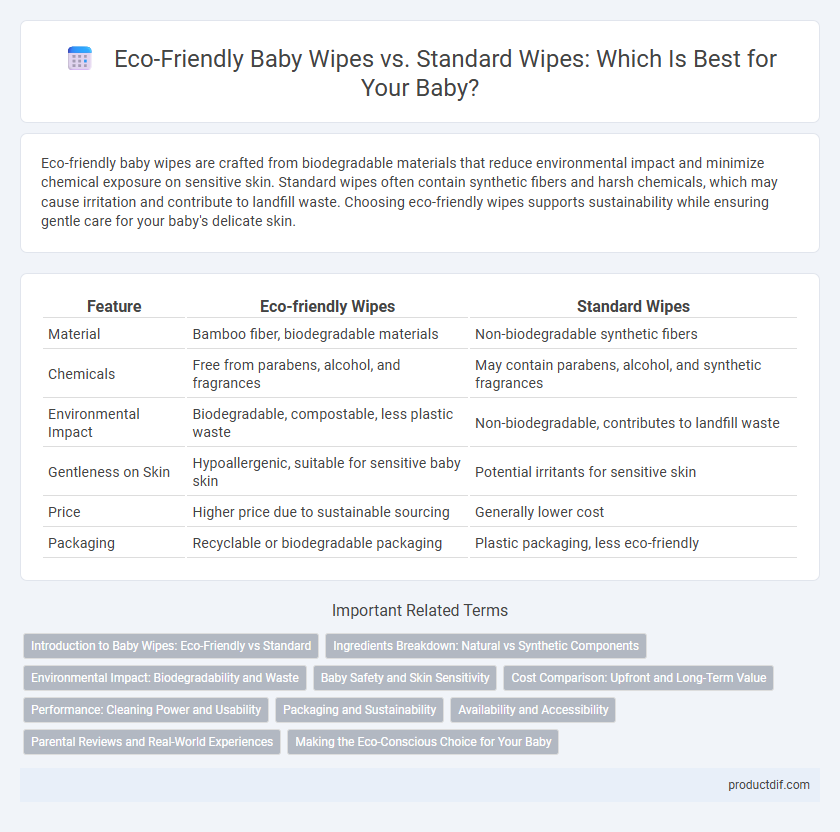Eco-friendly baby wipes are crafted from biodegradable materials that reduce environmental impact and minimize chemical exposure on sensitive skin. Standard wipes often contain synthetic fibers and harsh chemicals, which may cause irritation and contribute to landfill waste. Choosing eco-friendly wipes supports sustainability while ensuring gentle care for your baby's delicate skin.
Table of Comparison
| Feature | Eco-friendly Wipes | Standard Wipes |
|---|---|---|
| Material | Bamboo fiber, biodegradable materials | Non-biodegradable synthetic fibers |
| Chemicals | Free from parabens, alcohol, and fragrances | May contain parabens, alcohol, and synthetic fragrances |
| Environmental Impact | Biodegradable, compostable, less plastic waste | Non-biodegradable, contributes to landfill waste |
| Gentleness on Skin | Hypoallergenic, suitable for sensitive baby skin | Potential irritants for sensitive skin |
| Price | Higher price due to sustainable sourcing | Generally lower cost |
| Packaging | Recyclable or biodegradable packaging | Plastic packaging, less eco-friendly |
Introduction to Baby Wipes: Eco-Friendly vs Standard
Eco-friendly baby wipes are crafted from biodegradable materials and free from harsh chemicals, reducing environmental impact and minimizing skin irritation. Standard wipes typically contain synthetic fibers and preservatives that may cause allergic reactions and contribute to landfill waste. Choosing eco-friendly wipes supports sustainable parenting by combining effective cleaning with gentle, toxin-free care for sensitive baby skin.
Ingredients Breakdown: Natural vs Synthetic Components
Eco-friendly baby wipes are formulated with natural ingredients such as organic cotton fibers, plant-based aloe vera, and chamomile extracts, ensuring they are free from harmful chemicals and synthetic preservatives. Standard wipes often contain synthetic components including alcohol, parabens, and artificial fragrances, which can irritate sensitive baby skin and contribute to environmental pollution. Choosing eco-friendly wipes supports safer, gentler skincare for babies while reducing chemical exposure and promoting sustainability.
Environmental Impact: Biodegradability and Waste
Eco-friendly baby wipes are designed with biodegradable materials such as plant-based fibers, which significantly reduce landfill waste and minimize environmental toxins. Standard wipes typically contain synthetic fibers and plastics that can take hundreds of years to decompose, contributing to microplastic pollution and soil contamination. Choosing biodegradable wipes helps lower carbon footprints by promoting sustainable resource use and reducing long-term waste accumulation.
Baby Safety and Skin Sensitivity
Eco-friendly baby wipes use natural, biodegradable ingredients that reduce exposure to harsh chemicals, minimizing the risk of skin irritation and allergic reactions for sensitive baby skin. Standard wipes often contain synthetic fragrances, alcohol, and preservatives that can cause redness, dryness, or discomfort in delicate skin. Choosing eco-friendly wipes supports baby safety by providing gentle, toxin-free cleaning while protecting the environment.
Cost Comparison: Upfront and Long-Term Value
Eco-friendly baby wipes often have a higher upfront cost compared to standard wipes but provide greater long-term value by reducing environmental impact and minimizing exposure to harmful chemicals. Standard wipes may be cheaper initially but can contribute to waste buildup and potential skin irritation, leading to additional healthcare expenses. Investing in biodegradable, toxin-free wipes supports sustainability while potentially lowering overall costs associated with sensitivity treatments.
Performance: Cleaning Power and Usability
Eco-friendly baby wipes often use biodegradable materials and natural ingredients that maintain impressive cleaning power without harsh chemicals, making them safe for sensitive skin. Standard wipes typically offer strong cleaning performance with various synthetic detergents, but may cause irritation or leave residue due to preservatives and fragrances. In terms of usability, eco-friendly wipes tend to have a softer texture and good moisture retention, while standard wipes provide consistent thickness and durability, ensuring effective cleaning across different messes.
Packaging and Sustainability
Eco-friendly baby wipes feature biodegradable packaging made from recycled materials, significantly reducing plastic waste compared to standard wipes, which often use non-recyclable plastic containers. Sustainable wipes prioritize renewable resources and minimal environmental impact, ensuring less landfill contribution and lower carbon footprints. Choosing eco-friendly packaging supports circular economy initiatives and promotes long-term ecological balance in baby care products.
Availability and Accessibility
Eco-friendly baby wipes are increasingly available in major retail stores, specialty baby shops, and online platforms, though they may be priced higher than standard wipes. Standard wipes dominate most supermarkets and convenience stores due to widespread mass production and lower cost, making them more accessible for everyday use. Consumers seeking sustainable options can find eco-friendly wipes through subscription services and eco-focused brands, enhancing accessibility despite limited local availability.
Parental Reviews and Real-World Experiences
Parents consistently praise eco-friendly wipes for their gentle, biodegradable materials that minimize irritation and environmental impact, contrasting with standard wipes often criticized for harsh chemicals and excessive plastic waste. Real-world experiences highlight eco-friendly wipes' durability and moisture retention without sacrificing softness, making them a preferred choice for sensitive baby skin. Reviews emphasize a growing preference for sustainable options that align with health-conscious parenting and ecological responsibility.
Making the Eco-Conscious Choice for Your Baby
Eco-friendly baby wipes are crafted from biodegradable materials such as bamboo or organic cotton, reducing environmental impact while ensuring gentle care for sensitive skin. Standard wipes often contain synthetic fibers and chemicals that can contribute to pollution and cause irritation. Choosing eco-friendly wipes supports sustainable practices and promotes healthier skin for your baby by minimizing exposure to harsh substances.
Eco-friendly wipes vs Standard wipes Infographic

 productdif.com
productdif.com